The best recruitment CRM of 2024
These recruitment CRMs can ensure you access top talent

The best CRM software can be applied to a variety of use cases but one that is pertinent to most sectors is recruitment. Bringing the right talent through your doors is essential to long-term business success. If your employees are your most valuable asset, then you can’t afford to do anything other than prioritize your recruitment strategy.
One of the reasons why recruitment CRM software is so important is because of the high level of competition in the labor market. Even before recent tightening, recruitment was a competitive sector and organizations had to battle it out for the best talent. CRM software can be extremely helpful here, allowing businesses to carefully manage candidate relationships. They often provide added clarity to help you rank candidates and may employ automation or artificial intelligence to boost candidate engagement.
The best recruitment CRM software is more than just a database, of course. It should also provide an opportunity for collaboration among your recruitment team, facilitating clear channels of communication. By streamlining the feedback process, it also improves dialogue between employer and candidate. Personalized messages can be more easily deployed and deeper insights more clearly collected during the hiring process.
In the below guide, we detail which of the many CRM tools on the market are best suited to recruitment. We’ll take a close look at the respective strengths and weaknesses, covering criteria like features, pricing, support, and more. If you want further information on CRM solutions, we also have several other buying guides worthy of your consideration. This includes the best cloud CRM, the best CRMs for small businesses, and the best insurance CRM. We also have a guide to CRMs for real estate.
Reader Offer: Save 18% on Monday.com annual memberships
Monday.com is an easy-to-use and customizable work management platform, enabling teams of all sizes to plan, manage and centralize work. Get started now and boost your team's communication and productivity.
Preferred partner (What does this mean?)
The best recruitment CRM 2024 in full:
Why you can trust TechRadar
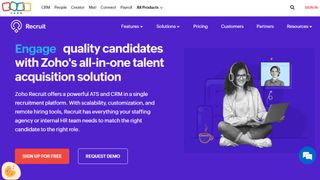
Reasons to buy
Reasons to avoid
Available as part of Zoho’s wide range of business tools, Zoho Recruit is a bespoke recruitment software that integrates closely with other solutions and functions as a huge advantage for HR teams.
It comes with a number of impressive features, streamlining the job posting process. It even utilizes AI tools to help with the discovery and ranking of clients based on recruiter requirements. There’s the option of running background checks and issuing assessment tasks to promising candidates.
Should organizations chance upon a prospective employee, they can use Zoho Recruit for candidate tracking and analysis so they achieve a clearer picture before progressing to the next application stage. There are also customization and branding options to further boost candidate engagement.
Boasting integrations with Microsoft Outlook, LinkedIn, Google Workspace, and other third-party tools, Zoho Recruit works extremely well on combination with other recruitment solutions. Having said that, there are other recruitment CRMs that offer even more integrations, as well as more candidate testing options.
In terms of pricing, Zoho Recruit does offer a free plan but it is limited to one active job post at a time. Its paid packages come in three forms: #standard, Professional and Enterprise. Which one is right for you will likely depend on what scale you are recruiting at (and your budget). The Standard plan lets you post up to 100 jobs for $25 / £20 / AU$37 per month when billed annually. Professional offers up to 250 jobs at $50 / £40 / AU$75 per month while the Enterprise plan lets you post up to 750 job listings for $75 / £60 / AU$112 per month.
Whichever payment plan you opt for, you’ll receive a recruitment tool that’s tough to beat. You can scour resumes with AI-powered modules, make job postings, and customize the entire platform. It lets you deliver a recruitment strategy that fits your goals.
Read our full Zoho Recruit review here.
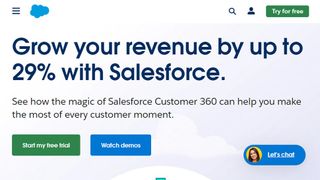
Reasons to buy
Reasons to avoid
A giant of the CRM space, Salesforce can help with all manner of business challenges - and recruitment is certainly one of them. Many HR tasks can be automated, allowing your recruitment teams to enjoy higher levels of productivity and focus on adding value. This is made easy by the 360-degree provided by the Salesforce platform,
In addition to the default functionality that all recruitment teams expect, Salesforce really comes into its own as a recruitment CRM due to the Salesforce AppExchange. This allows Salesforce users to access several other applicant tracking systems solutions to further add to their recruitment strategy. This includes a free Recruiting app that provides a framework for tracking open jobs and candidate credentials, including work experience, preferences, and comments from interviewers.
Salesforce is also great for fostering candidate loyalty by Salesforce supporting the personalization of candidate experiences at scale. Recruitment teams can provide connected, value-added services more easily due to the holistic view they gain of the recruitment process.
Of course, recruiters don’t have to make use of the AppExchange. Sticking with Salesforce’s default functionality still provides you with a great CRM - one that delivers a wide range of integrations, advanced reporting and a customizable dashboard. There’s plenty to admire here - and it could help you gain a competitive advantage in the war for talent,
Read our full Salesforce review here.
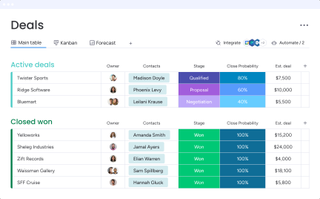
Specifications
Reasons to buy
Reasons to avoid
Monday Sales is a Customer Relationship Management (CRM) platform designed to assist sales and marketing executives in team management. It is highly user-friendly and provides a variety of tools to manage the customer journey. Additionally, the software is highly customizable, allowing users to adjust it to their individual needs.
Key features of the platform include email synchronization, the ability to send and receive emails, the ability to take notes during meetings, and the ability to view all communications on one timeline. Additionally, the primary feature of the platform is the ability to manage contacts, which organizes clients and potential clients into a single database and supports unlimited contacts. Monday Sales CRM also offers email support, with templates that can save time by automatically completing personalized emails.
In addition to automation, businesses can benefit from the ability to create tailored workflows to reduce administrative burden and improve communication. However, this requires a higher-level plan than the entry-level one, which begins at $14 per seat per month. The number of activities is limited to 250 per seat per month unless an upgrade is made.
Monday CRM offers four tiers, ranging from the Basic plan, which is $10 per seat monthly, to Enterprise plan, which can be customized for a higher price. Additionally, each plan must have at least three seats, which makes it less attractive for solo businesses.
There is no free tier, however, users can try the service for two weeks free of charge. Additionally, 18% off the monthly subscription is available if paid once a year.
Read our full Monday Sales CRM review.
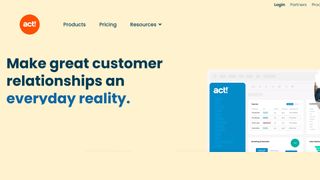
4. Act!
Reasons to buy
Reasons to avoid
Getting your recruitment right is essential no matter the size of your company - so small and medium-sized enterprises are just as likely to need a recruitment CRM as a huge multinational. If you are on the smaller side, there’s a good change that Act! Is the right recruitment CRM for your needs.
Developed by Swiftpage, Act! Is designed to support firms n managing their marketing and recruitment tasks from a central dashboard. Act! will store all the interactions between recruiters and candidates, helping teams to follow up on applications when necessary or set reminders to engage again to ensure relationships remain fresh.
In addition to providing a centralized repository for candidate contacts, Act! CRM also offers various automation options to help eliminate repetitive manual tasks for your recruitment team. Task and activity management modules, for example, streamline the recruitment process by helping HR personnel keep track of applications and their own individual to-do lists.
Although the user interface is a little clunky, Act! still does a great job in terms of contact management and, perhaps more impressively, offers a fantastic mobile version. Available for iPad, iPhone, or Android devices, Act!’s mobile offering means that recruitment personnel can still get their work done even when away from the desk. In a world of hybrid wording, this flexibility is hugely appreciated.
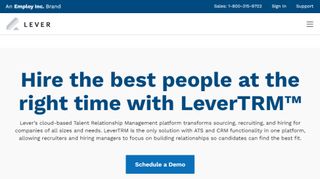
Reasons to buy
Reasons to avoid
Used by some major businesses, including Netflix, Mercedes-Benz, and KPMG, LeverTRM is a CRM and applicant tracking system that has some serious pedigree. Those organizations and many others have come to enjoy LeverTRM for the way its many features help to enhance the talent-sourcing process.
For instance, LeverTRM lets users design and customize their job adverts before tracking applications. A Google Chrome extension can be used to find candidate profiles too, making it easy to locate the wealth of information on the web regarding a potential employee.
This CRM also comes with various modules for designing and sharing candidate surveys and this is a solution that is equally suitable for small or large players. It has more than 100 integrations, a range of automations, and the option of bulk candidate management.
Another useful feature is the resume parsing tool, which will save recruitment teams a lot of time by automatically extracting essential information from candidate applications. This is especially useful in the early stages of the talent acquisition process, enabling HR teams to quickly weed out the candidates that aren’t the right fit. Powerful analytics functionality also helps improve the success rate of your recruitment. For any firm that wants their recruitment to be data-driven rather than decided on a hunch or best guess, LeverTRM ticks a lot of boxes.
Read our full LeverTRM review.
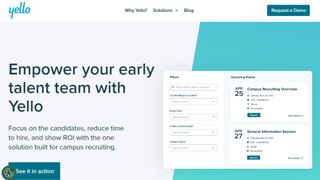
6. Yello
Reasons to buy
Reasons to avoid
Securing talented staff straight out of university is a great way of gaining first-rate employees and engendering employee loyalty right at the start of their careers. This is the aim of Yello, a recruitment CRM that incorporates a range of cutting-edge features that are likely to appeal to graduate applicants.
Yello offers virtual events and on-campus recruitment features that will help boost engagement among the younger cohort within the job market. Filtering options also work well, so you can quickly sift through the masses of potential employees to find the right talent.
Yello also offers personalization options so recruitment teams can impress candidates with a job portal that reflects their distinct company values - not one designed by a generic third party. Employees are more likely to gravitate towards a company with a distinctive look, so the option of creating your own UI could help boost recruitment.
Accompanying apps also enable businesses to provide pre-interview assessments and video interviews, if needed. It doesn’t matter which cohort you’re targeting, Yello is great for recruitment from a particular niche. So whether you want more graduate talent or simply to improve diversity at your organization, this is a CRM that is sure to impress.
Which recruitment CRM is right for you?
Recruitment is one of the most important workplace functions to get right - continually refreshing your workforce with talented employees will ensure your business adapts to new market conditions and pioneers new innovations. There are a range of CRM solutions that can help with this. Some are designed for smaller firms, some are great all-rounders, and others are specifically designed for recruitment. The right one for your firm will depend heavily on your resources and the market you’re recruiting from. Fortunately, there are so many recruitment CRMs on the market, there’ll certainly be one that’s right for you.
Are you a pro? Subscribe to our newsletter
Sign up to the TechRadar Pro newsletter to get all the top news, opinion, features and guidance your business needs to succeed!
Barclay has been writing about technology for a decade, starting out as a freelancer with ITProPortal covering everything from London’s start-up scene to comparisons of the best cloud storage services. After that, he spent some time as the managing editor of an online outlet focusing on cloud computing, furthering his interest in virtualization, Big Data, and the Internet of Things.

